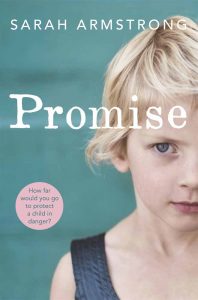
Kellie Byrnes speaks with author, Sarah Armstrong
It’s a daunting thought … the child next door is being abused. You know it, the neighbours know it, and you believe the child protection agencies know it. No-one is doing anything.

I caught up with author Sarah Armstrong to discuss her latest novel, Promise, which tackles this issue that has recently been played out in real life in the Australia media. Promise raises questions about each person’s responsibility for the children around them. The novel asks readers to consider, “What would I do?”
Q: How did news stories about family violence help inspire the story of Promise?
A: There was one particular story that inspired Promise – one story among many about children killed in their homes by a parent or step parent. A two-year-old boy died, and his mother was charged with his murder.
In one of the television stories, neighbours said they’d been concerned about him and had reported him to community services. I put myself in the shoes of those neighbours; they’d done their best to get him to the attention of authorities, they’d called several times, and yet, the boy died. I wondered—if I was them—if I might have wished that I’d just picked him up one day and put him in my car and driven away. That thought was what sparked the novel.
Since my daughter was born in 2010, I have been so much more aware of the vulnerability of children.
Creating a character who takes decisive action was perhaps a way for me to have a conversation with myself (and then, once published, with others) about how far our individual responsibility for other children extends and about whether there are ever occasions when it is right to break the law.

Q: What would you do if you knew that the child next door was being abused, and your calls to community services didn’t seem to be helping?
A: First I should say that I am no expert on child protection. But I do know that community services in each State have help lines you can call (anonymously if you wish) to report a child at risk. And I think it’s really important to call if you know a child is being abused; the child may have no other advocate. You might be it.
Community services are so understaffed that just one report of a child being at risk is most unlikely to prompt a caseworker to visit a family, anyway. It usually takes several, if not many, notifications.
If the situation is immediately dangerous, I’d call the police. I remember watching a panel discussion of family violence on the ABC, and a senior NSW police officer said that if we see or hear any family violence then we should call the police.
Just call the police. Violence is violence.
But in situations that are less acute—and unlikely to warrant intervention by community services—I think that offering support to the parents and support to the child(ren) is appropriate.
Being a parent is hard, and harder still if you add exhaustion, financial pressures, ill health and stress to the picture. There are many instances where support for the parent and child may be what’s most helpful. I suspect that in previous generations, there may have been more informal support for children and families. Today people are busy and isolated and less likely to offer informal support.
If I see a parent smacking and screaming at a child in a supermarket, I would hope that I’d offer the parent support and say something like, ‘Can I help? You look like you’re having a hard time.’ Support for that struggling parent is support for the child.
I’m not actually advocating people abduct an abused child, like my character, Anna, does (although I understand why she did it, and have been grappling with the question of whether it’s sometimes appropriate to break the law).
Q: Do you think the attention drawn to family violence following Rosie Batty’s incredible work in the area has resulted in a noticeable change in the way the media reports on family violence?
A: Luke Batty’s murder and Rosie Batty’s response to his death, and her subsequent campaigning seem—as far as I can tell—to have created a shift in the public conversation about family violence and in the media coverage of family violence.
Rosie Batty spoke so calmly, with such clarity and dignity (but not without anger and outrage), that she seemed to tap into something in the community. I have the sense that change has been brewing for a while but she seemed to nudge the conversation forward.
Q: For all the aspiring novelists out there, can you tell us a little about your process?
A: Thanks to my years as a journalist—working to deadlines in noisy newsrooms—I am able to write pretty much anywhere, anytime, and for ten minutes here and fifteen minutes there. But ideally, I have several quiet hours in my garden writing studio. And I do have that on the days when my daughter Amelia is at kindy.
Also I have a partner who works from home too, and Alan is a very engaged father. Well he’s a domestic god, really, and unsurprisingly, that helps enormously! When I am writing long hours, Al takes a greater load. And when he has a big job on, I do. And we do our best not to have our big projects coincide.
Our daughter Amelia was born just before my 42nd birthday but I had faced the real possibility that I might not become a mother. I feel so grateful every day to have been given that opportunity and I think that profound—even visceral—gratitude means that I don’t resent the time that mothering takes from my writing.
And because my time to write is limited, I am much more efficient and never procrastinate about getting to the desk.
Being a mother has also given me greater insight into the fundamental and (to me) fascinating relationship between mother and child. When I look back at my other two novels, (Salt Rain and His Other House), both of which were written before having Amelia, the parent-child relationship has long been a central theme for me.
Parenting inevitably takes from my time to write, but I love being a mother so much (even as I find it hard and challenging at times!), that it’s a price well worth paying.
About Sarah Armstrong:
Sarah’s first novel, Salt Rain, was shortlisted for the 2005 Miles Franklin Award. Her latest book, Promise, is published by Macmillan Australia and available now – click here to connect with the publisher.
Connect with the author, Sarah Armstrong – at her website or on her Facebook page.
You can also read my review of Promise here.
Kellie Byrnes is a full-time corporate writer and life-long avid reader who enjoys immersing herself in stories of many different genres, particularly children’s books.
Kellie’s debut children’s picture book will be published by Wombat Books in 2017/18, and when not writing she can often be found checking out the latest books, films, TV shows and theatre productions.

Leave a Reply